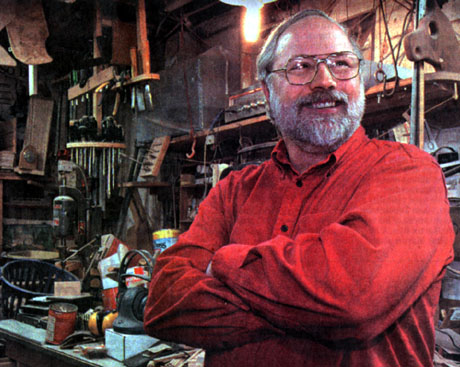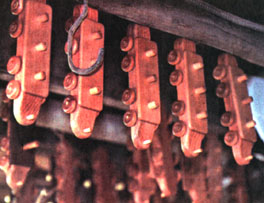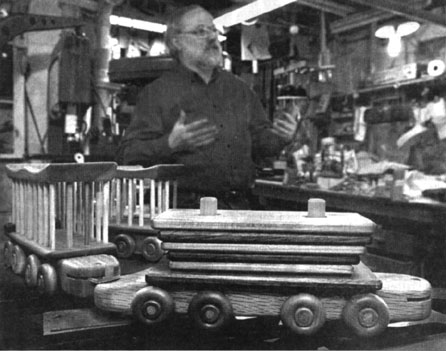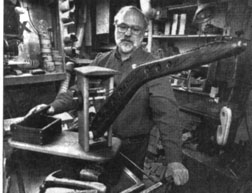This article appeared in my local newspaper December 13th, 1999.
|
Woodworker's Toys Have That Certain Something In this age of plastic, demand for Madison man's high-quality hardwood items is high. By Phil Brinkman John Michael Linck makes no apologies for the fact that "operators are not standing by" when customers call his tiny wooden toy shop on Madison's West Side. Instead, callers are likely to hear a sander winding down in the background as Linck puts his work aside to answer the phone himself. In a Pokemon age, Linck is an anachronism, turning out simple wooden toys by hand, one at a time. His rocking horses, toy trains and wooden block sets offer a refuge for parents who want an alternative to the cheap plastic junk kids go through these days like sugared cereal. "I believe a toy needs to engage a child and their creativity and imagination. I worry about these (Teen-age Mutant) Ninja Turtles," Linck said, exposing just how far behind the times he is (those were so 1990). "Are they still going to be around in 20 years?" |
Every surface is covered in John Michael Linck's 600-square-foot basement workshop, about half of which is given over to storage. Yet his wooden toys are in demand as far away as Hong Kong. |
|
Train cars in progress hang from the rafters in Linck's workshop, safe and out of the way in the cramped space.
|
Linck, the great-grandson of a German cabinetmaker, first got the feel of wood in his childhood basement workshop in Danville, Illinois. He later opened a woodworking shop specializing in furniture but became frustrated by the frequent requests to build cheap copies of furniture customers would find in department store catalogs. He eventually found his niche in wooden toys and in 1982 moved with his family to Madison. Linck is one of perhaps a handful of woodworkers in the state who make their living solely from toys. Not that you could tell that by looking at his basement workshop, a cramped little room overflowing with tools and half-finished projects. But from this modest space, real gems emerge. Demand for the high-quality hardwood toys is high, and the waiting period can be three or four months. (Forget about ordering something in time for Christmas; he's now taking orders for February.) "I'm definitely limited," Linck said. "There's only so much you can make with two hands." |
|
Linck used to advertise by traveling to arts and crafts shows around the country, a costly and time-consuming business. But the World Wide Web changed all that. Now, most of his customers are people he's never met and he's shipping packages to places like Istanbul, Hong Kong, Manila, Chile and Belgium. If the Internet seems an unlikely medium for Linck's work, consider this: Not long ago he took an order from a man who lived in rural Maine and who had neither electricity nor a telephone. The man found Linck's Web site (www.woodentoy.com) at his local library and used a pay phone to place the order. He wanted a wooden train. While Linck's toys don't appeal to everyone, the interest they do generate can be intense. For parents who grew up with similar toys, Linck's pieces are a chance to relive that time. In turn, Linck hopes, his toys may become future heirlooms. "With any care, a wooden toy will last indefinitely," he said. Linck's personal favorite is a riding crane, made of black walnut and black cherry with lots of moving parts. But he said the best toy is still the simplest: wooden blocks. "I don't enjoy making them very much, but in terms of play value, there's no better toy," he said. Children grow bored with toys that have a narrow purpose, said Linck who, with his wife, Jill , have two children, Michael, 20 and Bree, 16. But blocks can be arranged to be anything a child imagines, the designs becoming more sophisticated as the child grows. |
Circus cars and a flatcar with stacking wood tiles are two of the 17 train car designs Linck makes. |
|
"I want something that I would have enjoyed as a child," Linck said, demonstrating his riding crane, which he said can lift up to 100 pounds and contains a tool box under the seat.
|
While they're simple, Linck's toys aren't cheap. His train cars are $24 each (there are 17 in all); the riding crane goes for $275. Nor does he sell them through stores; almost everything is sold by mail order. Linck got his most visibility a few years ago, when Touchstone Pictures bought seven of his toys for the Steve Martin film, A Simple Twist of Fate, Martin played a woodworker, and two of Linck's toys were on the screen "for about 20 seconds." "At the end I was looking at the credits," he said. "There was the caterer, but not me. The prop suppliers don't get listed, I guess." While he's critical of many of the toys sold today, especially those that are marketed as Saturday morning cartoon tie-ins, Linck said there are also more good toys on the market today than ever. That's evident by the fact that stores that sell them , such as Puzzlebox, Highsmith Education Station or Zany Brainy, couldn't have existed years ago, he said. But Linck said he has no intention of expanding beyond his 600-square-foot workshop. At 48, he's comfortable with his job and doesn't want to expand. " I could see (hiring) an apprentice but not a six-man shop," he said. "I don't want to be a manager." |



